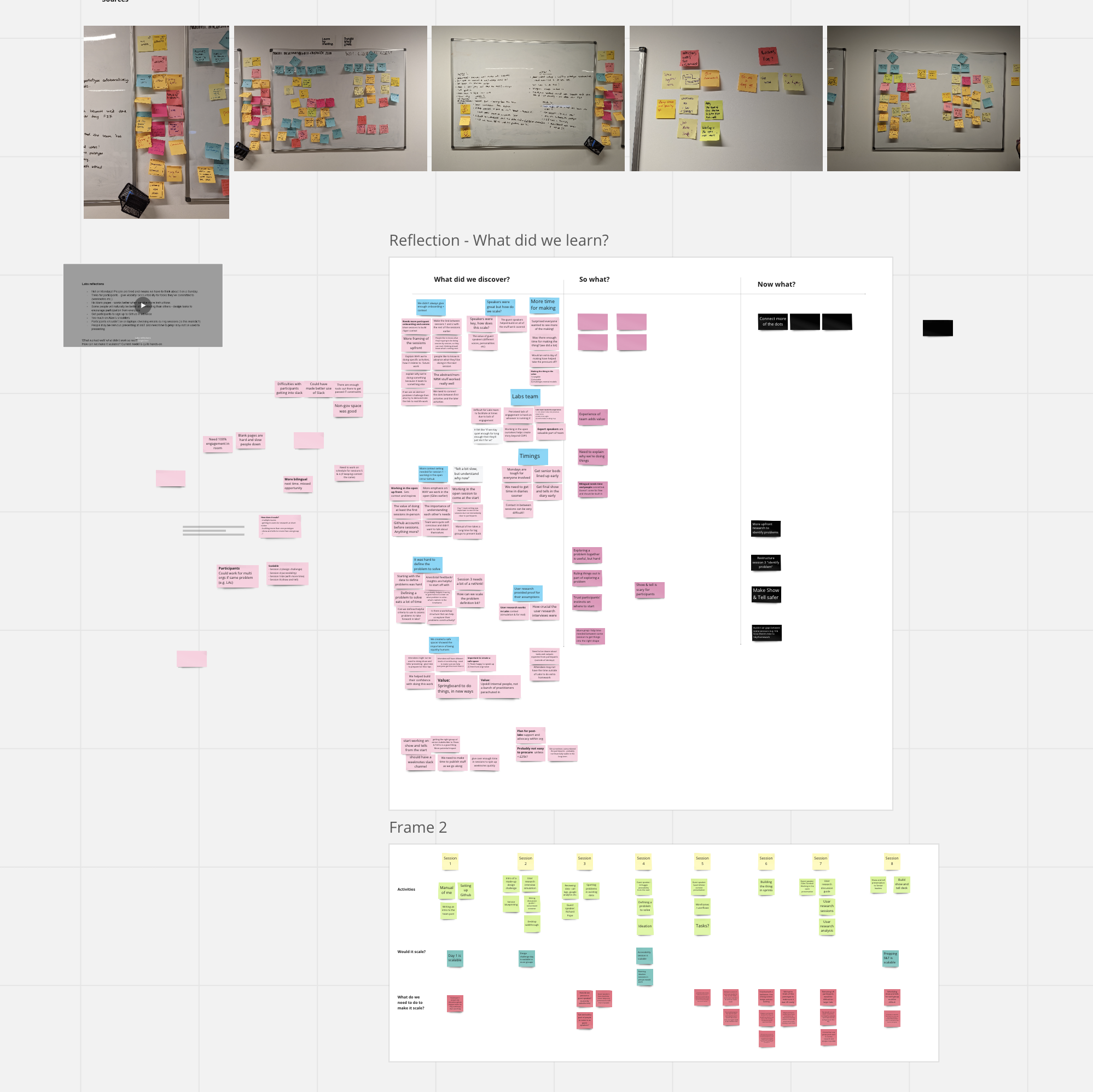Week eleven
22 December 2022
How is it week 11 already!? The time has absolutely flown by, but it’s been fun. A lot of fun.
The Labs team are getting ready to down tools for a break over the holidays, but before then here’s a quick run-through of what we’ve been working on this week.
Reflecting
Reflection has been the theme of this week. As much as we hope that the folk from NRW learnt some things over the past few weeks (and we think that they did, more on that in a bit), this was an experience for us to learn too.
It’s safe to say that back in week one when we first got together as a team none of us were 100% sure how this idea would pan out. There was a lot of learning as we went and adapting our plans based on what we felt was working and what we were being told wasn’t.
This scene from Wallace and Gromit comes to mind and isn’t too far from the truth!

What we learned
We spent some time as a team thinking about what we learned over the past 11 weeks. There’s quite a lot to unpack, but here are some of the top things we’ve taken away.
Talk about working in the open from the beginning
From the outset we said that one of our principles of Labs was to work in the open. While everyone seemed to buy into that, it only really became clear to participants how you can work openly after the session with Giles about Agile comms. Next time around we’d recommend having this conversation in the first session.
Defining a problem to solve
Session three where we aimed to identify which problem we were going to work on was one of the trickier days. It was the first that we ran remotely which may have had some bearing, but we also found it hard to know where to start.
We had so much rich information from web analytics, to call centre logs, customer feedback, previous reports, and more it felt as though we were pulling lots of threads but nothing was unravelling.
It was after taking a step-back and talking through people’s instincts as to what problems we could tackle that we were able to then go back to all the data and use that to help evidence and prioritise the thing we should focus on.
The value of user research
It feels obvious, but the value of bringing in real users to the Labs sessions was so powerful that it’s worth mentioning here. From the start we knew this was going to be important. Hearing directly from real users gave the team plenty of evidence that the problem they were tackling was valid, and reassurance that the approach they’d designed was something worth pursuing.

We have published a more in-depth write up of what we’ve learned if you’d like to read more.
Getting our website in order
The pace of having to prepare for each of the Labs sessions meant that we got a little bit behind with updating the website. This week we made time to make sure that everything was updated.
On the site you can see an overview of what we covered with a link to a page-per-session which talks about the goals for each day and the intended learning outcomes.
We’ve also got a list of the resources we used during labs, this includes some of the guides for things like getting started with Git and templates such as the service blueprint that we used in session two.
We have a backlog of blog posts inspired by what we’ve learnt over the past 11 weeks. Hopefully we’ll have time to write some of these in the new year, however this week Colm provided some thoughts about the tools we used for making and Gwen and Jamie on some of the things we learnt.
What’s next?
On the website we described what we were doing as “a short experiment to explore how people learn by making things”.
At the end of this initial experiment we really feel that there is something to this approach that makes people understand user-centred design beyond the theory. The feedback that we’ve received from the NRW team has been positive, you can read their thoughts in their weeknotes, and what we as a team have experienced through running these sessions makes us believe that there is something worthy of pursuing here.
We’re not entirely sure what will happen next. But we’ve started to put together a high-level roadmap that describes some of the areas it’d be good to explore next and we hope that it’ll stimulate further conversations in the new year.
Thanks!
This Labs pilot wouldn’t have been a success without the people who joined us. Huge thanks to our expert speakers, Richard Pope, Alistair Duggin, Sarah Winters and Giles Turnbull.
And of course, the team from NRW whose enthusiastic participation and willingness to try something new made the experience so rewarding for us. We’ve linked to them above, but we think their weeknotes are great, so here’s another pointer to them incase you didn’t click the first time! Thanks Lucinda, Laura, Sam, Owain, and Heledd.
Get involved
All our code is available on GitHub.
If you’d like to get in touch or you’d like to get updates by email, drop us a message at hello@learnbymaking.wales